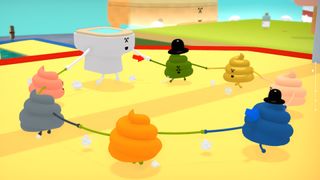Reminder: Remote Play Together is one of Steam's best features
When it works, it turns local multiplayer games into online multiplayer games surprisingly well.

As an idea, Remote Play Together is the perfect Steam feature. It turns local multiplayer games into online multiplayer games without developers having to make their own online modes. Just by existing, it makes loads of Steam games better, at least for people who can't be in the same room together to play them, which is most of us here in 2020.
Of course, internet connections are wobbly, and so Remote Play Together can result in 15 minutes of starting and restarting a game before ultimately saying to hell with it, it's not working today. When I have gotten it working, though, the feature has allowed me to play games like TowerFall Ascension with friends, which I just couldn't have done two years ago, given that I'm not physically near anyone I play games with. Sweetening the deal is that only the person hosting a Remote Play Together session has to own the game being played. That's how things would be if you were actually at your friend's house, but it's always a little surprising when there isn't a catch.
Some games that particularly benefit from Remote Play Together:
Remote Play Together is an offshoot of Steam Remote Play, which is also a cool feature, but one that I never use. Remote Play allows you to run a game on your PC and stream it to a screen somewhere else on your home network. Last year Valve expanded the feature so you could stream from your home PC no matter where you were, as long as you had an internet connection. It's like a virtual desktop, but optimized for gaming—or, like Stadia, but your own PC takes the place of a data center.
Remote Play Together works the same way, except that you're streaming the game over the internet to a server, which relays the video to friends you invite through your friends list. Meanwhile, their controller or keyboard input is sent back to your PC so that they can control a character, or whatever they need to control in the game you're playing. More than 200 games on Steam support the feature.
In theory, the host will have a slight advantage in competitive games because they get the locally-rendered version—no lag, no input delay. In my experience, though, the streaming delay hasn't felt as noticeable as you might expect. It's there, but as much as I wanted to blame network conditions when IGN deputy reviews editor (and PC Gamer alum) Tom Marks beat me at Boomerang Fu, I think he was just better at throwing boomerangs than I was.
Tom has run a few of the Steam Remote Play Together sessions I've joined. Things were a bit shaky with his old internet connection, which he tells me got around 125 Mbps down and between 10 and 15 Mbps up. It worked fine a few times, but sometimes it would work for a bit, and then the stream would get super artifacted and become unplayable for the remote players.
The biggest gaming news, reviews and hardware deals
Keep up to date with the most important stories and the best deals, as picked by the PC Gamer team.
After Tom upgraded to gigabit fiber internet, the experience become much more consistent, to the point that he could stream a five-player game with one player in England (like me, Tom's in California), and the only issue was input delay that was bad enough to be "noticeable," but that they could play through.
So, with the caveat that Remote Play Together is best if the host has a fast internet connection, it really can work. (And you don't need gigabit fiber, it's just nice.)
If you don't have any games that support Remote Play Together, I suggest testing it out with a cheap one, just in case it doesn't work well with your particular internet setup and friend group (and you can always refund the game).
As runner-up for the best recent streaming-related feature, I'll throw in a nod to Discord's Go Live streaming, which was introduced in the summer of 2019. It is a very easy way to stream a game to a handful of friends, which sometimes is all you want to do (as opposed to running a public Twitch stream). And you don't have to just use it for game streaming—it's a way to watch videos together, which has been especially nice to have in 2020. Discord just made it possible to screen share from a phone, too.

Tyler grew up in Silicon Valley during the '80s and '90s, playing games like Zork and Arkanoid on early PCs. He was later captivated by Myst, SimCity, Civilization, Command & Conquer, all the shooters they call "boomer shooters" now, and PS1 classic Bushido Blade (that's right: he had Bleem!). Tyler joined PC Gamer in 2011, and today he's focused on the site's news coverage. His hobbies include amateur boxing and adding to his 1,200-plus hours in Rocket League.
Most Popular


